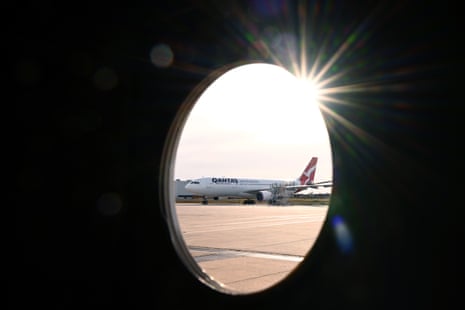Qantas and Virgin now account for 95% of Australia’s domestic aviation market, a dominance that dwarfs industries such as banking and supermarkets and has allowed the airlines to jack up profit margins, the national airport body has warned.
The continued duopoly of Qantas Group – which includes budget carrier Jetstar – and Virgin Australia in the domestic aviation sector has also allowed air fares to rise above pre-pandemic levels even when adjusting for inflation, the Australian Airports Association (AAA) said in its submission to a parliamentary inquiry.
Domestic air fares in Australia have increased by 22.6% between 2019 and 2022, the AAA said, with an increase of 19.3% between the first quarters of 2020 and 2023.
Airlines have been increasing air fares despite the price of jet fuel falling. Prices dropped to US$137 a barrel in May, down from the high of $US259 in June 2022, after the invasion of Ukraine when airlines cited the high cost of fuel to justify record ticket prices.
The AAA said despite cheaper jet fuel, and airport charges increasing by just 3% between 2019 and 2022, Australian domestic air fares were still high.
Meanwhile, without meaningful competition, the two airline giants have had little incentive to improve on time performances, with the AAA noting cancellation and delay rates have regressed.
The AAA said domestic on-time performance for April 2023 was 71.8%, “well below the long-term industry average” of 81.5%.It raised concern at Qantas and Virgin’s market share, but was most concerned with Qantas’ dominance – now 66% of domestic aviation – especially after the pandemic when Virgin went into receivership and emerged with new owners.
Analysis of Qantas’ domestic earnings before interest and taxes (EBIT) – an indication of profit margins – shows an increase from 12% in 2016-17 to the 18% forecast in the past financial year. This effectively represented a 50% increase in profit margins over the six-year period.
The AAA said typical profit margins for domestic aviation operators in Australia were between 8 and 10%. It pointed out how the profit margin of Woolworths – a company which has itself been alleged to have increased its margins through the cost of living crisis – has increased from 5.6% to 5.9% over the past three years.
Qantas and Virgin’s 95% market share is significantly higher than other industries, the AAA said. In banking, the top two players – Commonwealth Bank and Westpac – control 47.3% of the mortgage lending market, while the big four banks control 75.2% of the market.
Coles and Woolworths have 64% of market share for food and grocery, while in telecommunications, Telstra and Optus control 81% of the market, the AAA submission said.
The Australian Airports Association chief executive, James Goodwin, said Australians were paying higher air fares as a result of Qantas and Virgin’s leverage.
“There’s no winners when any market is dominated so much by one or two players, it really changes how a market operates,” he said.
Goodwin said Australia was approaching a point where “new competitors are too scared to enter the market”.
after newsletter promotion
“The two major players decide where they fly and when they fly, and regulators can become reluctant to act because we are so reliant on them to allow Australians to fly.”
His comments come after Bonza, a new airline which launched in January, on Thursday announced it would axe five of its 27 routes due to low demand.
Goodwin called on the Albanese government to direct the Australian Competition and Consumer Commission (ACCC) to continue its airline competition monitoring, which was launched by the Coalition at the start of the pandemic.
The directive expired in June, and in its final report, the ACCC savaged policy shortcomings that it said were shutting out meaningful competition in aviation – most notably the allocation of slots at Sydney airport where the number of take-offs and landings are capped by legislation.
Bonza and Rex have complained they are unable to access peak time slots that allow them to expand services to Sydney.
A Qantas spokesperson said Australia was “one of the most open and competitive aviation markets in the world and for the first time ever we now have four jet airlines competing in the domestic market”.
The spokesperson said the airline had improved punctuality and mishandled baggage rates in recent months.
Virgin was contacted for comment.
